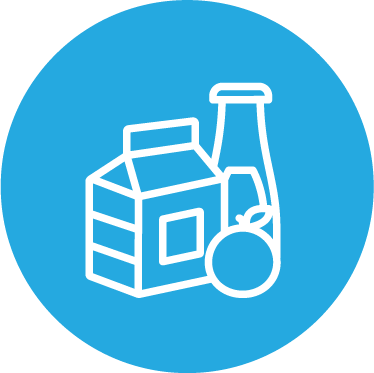Zero Waste Tips
Rethink. Reduce. Reuse. Recycle.
Waste Not is not only about reducing the amount of resources we consume, but its also (and more importantly) about rethinking the actions we take in our everyday lives. This includes everything from which products we buy to the food we eat.
Although we understand that we are sometimes limited in our choices (i.e. food insecurity, cost of living, etc.), we must remember that we are never limited on how much of a positive impact our individual choices can make.
Check out our list of zero waste tips below to start living your best [zero waste] life!

- Plan your meals ahead of time! Keep a running list of the meals and their ingredients your household enjoys, then to avoid overbuying, make your weekly shopping list according to the meals you plan to make that week.
- Ditch the single-use coffee pods and switch to a regular coffee machine (with a reusable filter) or french press. Or invest in refillable coffee pods.
- Learn to compost your food scraps at home. Many cities, including Long Beach, offer free composting workshops and subsidized prices on home compost bins.
- Learn the best ways to store different fruits and vegetables to maintain freshness the longest.
- Learn the difference between “sell-by,” “use-by,” “best-by,” and expiration dates to avoid tossing food that is still safe to eat.

-
Pack your own lunch for work/school! Create a zero waste meal kit with durable, reusable items including: food containers, a beverage/water bottle, utensils, metal/glass straw, and cloth napkin.
-
When ordering take out, just say no to napkins, straws, sauce packets, plastic forks and other single-use items.
-
Remember to bring your reusable beverage mug/container when going out for your daily coffee/tea. Many places even offer a discount to those who bring their own!
-
At restaurants, ask your server about portion sizes to avoid ordering more than you can eat. Consider splitting meals with others and always take leftovers home.
-
Bring reusable to-go ware with you to restaurants to pack your leftovers.

Product and food packaging makes up a huge proportion of our waste stream.
-
Remember to bring your reusable shopping bags (including reusable produce bags) when you shop. Stash a small one in your purse or backpack and try hanging grocery bags on the door knob after unpacking them so you’ll remember to take them to your car the next time you go out.
-
To minimize waste from food packaging, shop at markets that sell staples such as rice, cereal, nuts, and grains in bulk and bring your own reusable bags/containers.
-
Find your nearest farmers market and shop at it regularly for local, fresh, unpackaged produce and food products.
-
Rethink the amount of stuff you buy. When tempted to indulge in “retail therapy,” consider doing something else you find fulfilling like spending time with friends or going for a walk.
-
Reuse the cardboard boxes to ship donated items to charity for free when you purchase from online retailers such as Amazon.

School and office work typically requires an abundance of paper, but there are several ways you can reduce your waste.
-
At work, strive for a paperless workflow by using OneDrive or Google Drive to share and track different drafts of documents and projects.
-
When printing is necessary, always print double sided
-
Submit/accept assignments and other work products electronically
-
Bring your laptop to class or to meetings to take notes and reduce your paper consumption.
-
Use DocuSign at your office for electronic signatures.

Big events generate a lot of waste due to the use of disposable plates and utensils.
-
Before an event, take inventory of utensils, paper cups, napkins, etc. Ask caterers not to bring these items.
-
Tell guests to bring their own mugs and utensils, so that they don’t have to throw away extra paper or plastic.
-
Worried about leftovers? Before the event, research organizations that are able to distribute the food to people who need it.

Here are some Tips to living in the campus' dorms sustainably!





